CANBERRA (BLOOMBERG, AFP) - Australia has begun a diplomatic thrust to repair its relationship with largest trading partner China, damaged by the nation's ban of Huawei Technologies from bidding for 5G contracts and the introduction of anti-foreign interference laws aimed at Beijing.
Prime Minister Scott Morrison's government on Friday (March 29) announced the formation of the National Foundation for Australia-China Relations, which will use the private sector, industry lobby groups, and non-government and cultural organisations to "turbo-charge our national effort in engaging China."
Foreign Affairs Minister Marise Payne said in a statement the new foundation would receive Aus$44 million (S$442.3 million) over five years, significantly broadening the remit of its predecessor.
She said the more than 40-year-old Council had remained "static even as China has transformed and our bilateral ties have dramatically expanded in breadth and complexity."
Payne said the "substantially increased" funding would allow the new body to "move beyond the Council's current focus on education, culture and the arts, to also promote Australian excellence in areas such as agriculture, infrastructure, health and ageing and the environment and energy."
Bilateral ties have soured, notably since Canberra passed sweeping national security reforms last year to strengthen foreign interference laws, calling out China as its primary concern, and setting off a string of diplomatic flare-ups.
A high-profile Australian senator was forced to quit politics in 2017 over his links to Chinese billionaire Huang Xiangmo, a permanent Australian resident who last month was banned from returning to the country following scrutiny of his Communist Party ties. Beijing has dismissed the claims of political interference as paranoia and hysteria.
Australia last year also announced guidelines for contractors to build fifth-generation - or 5G - mobile networks that effectively blocked Chinese telecom giant Huawei. Canberra cited intelligence agency warnings against using vendors subject to "extrajudicial directions from a foreign government".
Australia has been increasingly concerned the conflict with China is impacting trade. Coal imports into the nation are taking longer than normal, with Glencore last month blaming tensions between the nations.
Australian beef and wine exporters last year said political friction had caused their products to be held up at Chinese ports, after then-Prime Minister Malcolm Turnbull implicitly criticised Chinese meddling in Australian politics and universities.
"We have different perspectives on some important issues and the new foundation will encourage and enable considerable constructive discourse and engagement between our two countries," Payne said in the statement.
The announcement came on the same day the nation welcomed a new ambassador to China who may also help Morrison reset relations. Graham Fletcher, whom the Australian newspaper describes as a fluent Mandarin speaker with three previous postings to Beijing, will take the prized post.
Australia isn't alone in pondering how to respond to a trade-driven backlash by China. Beijing is also choking off canola sales from Canada after Huawei Chief Financial Officer Meng Wanzhou was arrested there in response to a US extradition request.

